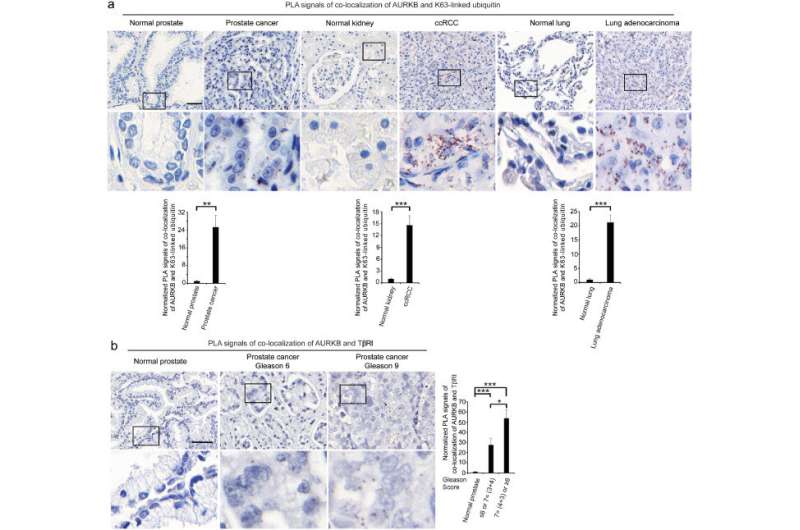Prognosis of cancer patients improved through significant discovery

Prostate cancer is the most common form of cancer in males in Sweden. Researchers at Umeå University have now discovered a faster and easier way to determine who has an aggressive form of cancer and who does not.
"This may have great implications on precision medicine when treating prostate cancer, and on more cancer groups alike," says Maréne Landström, professor of pathology at Umeå University.
More than 10,000 men are diagnosed annually with prostate cancer in Sweden. Out of those, 2,300 cannot be saved, whereas many others can be cured or actually have benign tumors. The medical services are struggling in a balancing act between detecting as many cancers as possible early enough to start treatments, and avoiding diagnosis when the tumor is harmless, as this causes unnecessary anxiety and negatively impacts the quality of life.
Consequently, intense work is carried out at research institutes to improve the methods for distinguishing cancers that require treatment from cancers that should be left untouched, or preferably should not even be detected. The research group of Professor Maréne Landström at the Department of Medical Biosciences is busy studying just that. In this project, they have also collaborated with a research group at Uppsala University. The Umeå researchers have now discovered a new function in specific proteins in the transforming growth factor beta (TGF-β) signaling pathway, which is a significant path that affects how cancer cells grow and spread. This may have implications on the treatment of cancer, as the discovery makes it possible to identify the men who are at risk of developing aggressive and life-threatening prostate cancer more easily and earlier in the course of disease. This finding has been published in an article in eBioMedicine.
"We have found a new, previously unknown, function of the TGF-β type I receptor (TbRI), which is an important signaling protein in cancer cells. Previous studies have shown that TGF-β signaling is important in the development of several cancer forms," says Maréne Landström, professor of pathology at the Department of Medical Biosciences at Umeå University. "But with the use of this new discovery, we can put the men with prostate cancer whose prognosis is promising at ease, and those with high-risk prostate cancer can be offered treatment sooner. Our findings and the publication is significant for a large group of patients with prostate cancer, and there is reason to believe that further patient groups will benefit from this."
Jie Song, first author of the publication in eBioMedicine says, "Our discovery is a breakthrough in cancer research in the field of TGF-β signaling. We have discovered that AURKB, which is a kinase usually overexpressed in cancer cells, interacts with TβRI during cell division of both prostate cancer cells and neuroblastoma cells, which is a form of cancer common in children. We have also shown that TRAF6—an enzyme which causes so-called K63-linked polyubiquitination—ubiquitinates AURKB on two amino acids and thereby contributes to the kinase activity of AURKB when cancer cells proliferate. By in situ PLA technique, we show that K63-linked polyubiquitination of AURKB is present in lung adenocarcinoma, prostate cancer and clear cell renal cell carcinoma in patient tissue sections. Moreover, the AURKB-TβRI complex is correlated with the malignancy of prostate cancer. Our results suggest that the AURKB-TβRI complex may be a useful biomarker for early detection of advanced prostate cancer, which may be of huge clinical benefit in the development of precision drugs for treating prostate cancer."
The researchers have applied for a patent through the pharmaceutical development company, MetaCurUm Biotech AB, and recruited additional members to the research group.
"We wish to really reach out with these news to the medical services as we think it can be of great use to patients with cancer, and to the medical services in general," says Maréne Landström. "We will apply for funding from innovation agencies such as Vinnova and others to develop a method that the medical services can use. We estimate that it will take us two to three years to develop a test based on our findings.
"We are now investigating the molecular mechanisms for how these proteins can affect the activity of one another. This takes place in a research project in collaboration with Professor Magnus Wolf-Watz at the Department of Chemistry at Umeå University, and through studies of clinical samples from patients together with our clinical partners from the medical service."
More information: Jie Song et al, The ubiquitin-ligase TRAF6 and TGFβ type I receptor form a complex with Aurora kinase B contributing to mitotic progression and cytokinesis in cancer cells, eBioMedicine (2022). DOI: 10.1016/j.ebiom.2022.104155
















